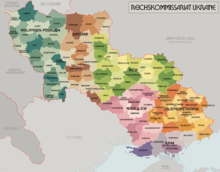Ernst Hartmann (SS-Brigadeführer)
Ernst Hartmann | |
|---|---|
| Born | 10 May 1897 SS and Police Leader, "Tschernigow;" "Shitomir;" "Pripet;" "Wolhynien-Luzk" (Acting) |
| Battles/wars | World War I World War II |
| Awards | Iron Cross,2nd class Clasp to the Iron Cross, 2nd class War Merit Cross,2nd class with Swords |
Ernst Hartmann (10 May 1897 – 3 May 1945) was a German SS-
Early life
Hartmann was born in
After his return from captivity, Hartmann was discharged from the service with the rank of Oberleutnant, and worked for several years as an engineer and locksmith for an aircraft manufacturer. He then went to China where he was employed as a flight instructor for the Chinese Air Force from 1925 to 1928. From 1928 to 1930 he worked as an aeronautics engineer in several European countries before returning to Germany in 1930 and landing a job at Junkers Aircraft and Motor Works in 1930, serving as a flight leader from 1933 to 1935.[1]
SS peacetime career
Hartmann joined the
Second World War
Hartmann was trained for police duties and deployed to the occupied

At the same time, Hartmann had been serving since 10 February 1944 as the permanent Deputy to SSPF "
Hartmann died on 3 May 1945 of pancreatic cancer, very shortly before the end of the war in Europe, in a hospital in Karlsbad (today, Karlovy Vary).[6]
SS ranks
- 20 April 1937: SS-Standartenführer
- 30 January 1942: SS-Oberführer
- 1 August 1944: SS-Brigadeführer and Generalmajor of Police
References
- ^ a b Yerger 1997, p. 115.
- ^ a b Schiffer Publishing Ltd. 2000, p. 27.
- ^ Yerger 1997, pp. 115, 147, 179.
- ^ Yerger 1997, pp. 67–68, 115.
- ^ Yerger 1997, pp. 62, 115.
- ^ Death Registry of Ernst Hartmann (record 2104) in Karlovy Vary Registry Office 64, retrieved 14 May 2022
Sources
- Schiffer Publishing Ltd., ed. (2000). SS Officers List: SS-Standartenführer to SS-Oberstgruppenführer (As of 30 January 1942). Schiffer Military History Publishing. ISBN 0-7643-1061-5.
- Yerger, Mark C. (1997). Allgemeine-SS: The Commands, Units and Leaders of the General SS. Schiffer Publishing Ltd. ISBN 0-7643-0145-4.
